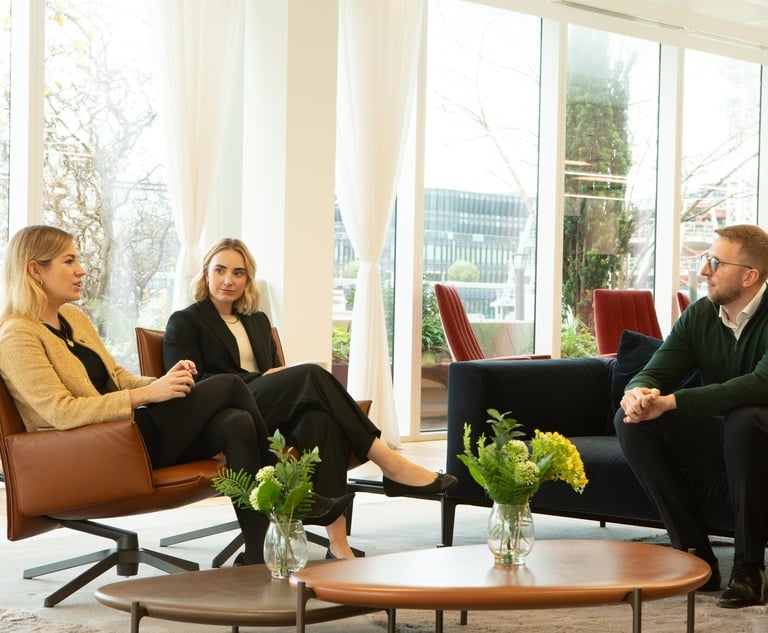 Bruce Sewell, former Apple senior vice president and general counsel/photo by Diego M. Radzinschi/The National Law Journal
Bruce Sewell, former Apple senior vice president and general counsel/photo by Diego M. Radzinschi/The National Law JournalGrowing an In-House Career: Five Tips From Former Apple General Counsel
Former Apple and Intel general counsel Bruce Sewell gave early career lawyers advice for in-house success in an interview with Doreen Benyamin, an LSAT tutor who hosts the YouTube channel Before You Take the LSAT.
June 10, 2019 at 06:32 PM
3 minute read
The original version of this story was published on Corporate Counsel
Bruce Sewell, the former general counsel of Apple and Intel, shared lessons from his three decades of legal industry experience with earl- career lawyers in a Sunday interview published by YouTube channel Before You Take the LSAT.
In the nearly hour-long interview with channel host and LSAT tutor Doreen Benyamin, Sewell gave law students a glimpse of life in-house at large corporations, answering questions and offering advice on what it takes to cut it as a general counsel. Here are five takeaways:
1. When a crisis hits, stay calm. In times of crisis, Sewell said time seems shorter and every decision comes under pressure. General counsel should be able to keep a clear head and, even with heightened stakes, lead their team and company with rational, well thought-out decisions. "That combination of a lot of stress and noise and compressed timeframe… make for bad decision-making," he said. "And if you can find a way to step back from that, keep your head, be levelheaded [it helps]."
2. Litigator vs. transactional lawyers. Sewell began his legal career as a litigator, but he took a transactional lawyer gig for his first in-house role at Intel. There are benefits to entering a legal team as either type of lawyer, he said. For litigators, it is "easier to move around within the corporate environment", because of the foundational skills in conflict resolution and risk spotting developed in the role. He said transactional lawyers are more likely to "have opportunities to step over into the business space that don't exist for other people in the legal department, but you probably won't have a lot of opportunities to move around within the legal department".
3. Don't rush in-house. Companies usually look to hire lawyers who have spent between three to five years at a firm, Sewell said, when they've "learned the basic… skills of whatever practice area you've decided to pursue, but you're still young enough in your career that you can learn how to do it the Intel way or learn how to do it the Apple way". The second "sweetspot" is after around 10 years at a firm. He said in-house lawyers need to be "the legal expert" and usually cannot get the professional training firms provide at companies.
4. Learn how to lead large groups and manage small ones. At Apple, Sewell was responsible for a legal department of about 900 people, though he only directly managed 10 employees. "My role primarily was to… provide some sort of strategic compass to the group and then be an immediate mentor and supervisor to the 10 people who worked directly for me," he said. "And then they would carry that message and they would hopefully role-model the same characteristics that I wanted the department to exhibit."
5. Business sense, not just legal, is crucial in-house. That means sometimes embracing risks and using them to the company's advantage, rather than staying in safety mode. Businesspeople, he said, unlike lawyers, are trained to manage risk versus eliminate it, and company lawyers should be able to do the same. General counsel should "be sympathetic to and respond to that [business risk] approach of, 'I'm not trying to eradicate risk… I'm trying to use risk as my friend'," he said.
This content has been archived. It is available through our partners, LexisNexis® and Bloomberg Law.
To view this content, please continue to their sites.
Not a Lexis Subscriber?
Subscribe Now
Not a Bloomberg Law Subscriber?
Subscribe Now
NOT FOR REPRINT
© 2024 ALM Global, LLC, All Rights Reserved. Request academic re-use from www.copyright.com. All other uses, submit a request to [email protected]. For more information visit Asset & Logo Licensing.
You Might Like
View All
Paul Weiss Says Progress Means 'Embracing the Uncomfortable Reality'
5 minute read

GCs Say They are Getting 'Edged Out' of UK Boardrooms

‘We’re In Need of a Fix’—Is London’s Litigation Market in Trouble?
Trending Stories
- 1'Largest Retail Data Breach in History'? Hot Topic and Affiliated Brands Sued for Alleged Failure to Prevent Data Breach Linked to Snowflake Software
- 2Former President of New York State Bar, and the New York Bar Foundation, Dies As He Entered 70th Year as Attorney
- 3Legal Advocates in Uproar Upon Release of Footage Showing CO's Beat Black Inmate Before His Death
- 4Longtime Baker & Hostetler Partner, Former White House Counsel David Rivkin Dies at 68
- 5Court System Seeks Public Comment on E-Filing for Annual Report
Who Got The Work
Michael G. Bongiorno, Andrew Scott Dulberg and Elizabeth E. Driscoll from Wilmer Cutler Pickering Hale and Dorr have stepped in to represent Symbotic Inc., an A.I.-enabled technology platform that focuses on increasing supply chain efficiency, and other defendants in a pending shareholder derivative lawsuit. The case, filed Oct. 2 in Massachusetts District Court by the Brown Law Firm on behalf of Stephen Austen, accuses certain officers and directors of misleading investors in regard to Symbotic's potential for margin growth by failing to disclose that the company was not equipped to timely deploy its systems or manage expenses through project delays. The case, assigned to U.S. District Judge Nathaniel M. Gorton, is 1:24-cv-12522, Austen v. Cohen et al.
Who Got The Work
Edmund Polubinski and Marie Killmond of Davis Polk & Wardwell have entered appearances for data platform software development company MongoDB and other defendants in a pending shareholder derivative lawsuit. The action, filed Oct. 7 in New York Southern District Court by the Brown Law Firm, accuses the company's directors and/or officers of falsely expressing confidence in the company’s restructuring of its sales incentive plan and downplaying the severity of decreases in its upfront commitments. The case is 1:24-cv-07594, Roy v. Ittycheria et al.
Who Got The Work
Amy O. Bruchs and Kurt F. Ellison of Michael Best & Friedrich have entered appearances for Epic Systems Corp. in a pending employment discrimination lawsuit. The suit was filed Sept. 7 in Wisconsin Western District Court by Levine Eisberner LLC and Siri & Glimstad on behalf of a project manager who claims that he was wrongfully terminated after applying for a religious exemption to the defendant's COVID-19 vaccine mandate. The case, assigned to U.S. Magistrate Judge Anita Marie Boor, is 3:24-cv-00630, Secker, Nathan v. Epic Systems Corporation.
Who Got The Work
David X. Sullivan, Thomas J. Finn and Gregory A. Hall from McCarter & English have entered appearances for Sunrun Installation Services in a pending civil rights lawsuit. The complaint was filed Sept. 4 in Connecticut District Court by attorney Robert M. Berke on behalf of former employee George Edward Steins, who was arrested and charged with employing an unregistered home improvement salesperson. The complaint alleges that had Sunrun informed the Connecticut Department of Consumer Protection that the plaintiff's employment had ended in 2017 and that he no longer held Sunrun's home improvement contractor license, he would not have been hit with charges, which were dismissed in May 2024. The case, assigned to U.S. District Judge Jeffrey A. Meyer, is 3:24-cv-01423, Steins v. Sunrun, Inc. et al.
Who Got The Work
Greenberg Traurig shareholder Joshua L. Raskin has entered an appearance for boohoo.com UK Ltd. in a pending patent infringement lawsuit. The suit, filed Sept. 3 in Texas Eastern District Court by Rozier Hardt McDonough on behalf of Alto Dynamics, asserts five patents related to an online shopping platform. The case, assigned to U.S. District Judge Rodney Gilstrap, is 2:24-cv-00719, Alto Dynamics, LLC v. boohoo.com UK Limited.
Featured Firms
Law Offices of Gary Martin Hays & Associates, P.C.
(470) 294-1674
Law Offices of Mark E. Salomone
(857) 444-6468
Smith & Hassler
(713) 739-1250







